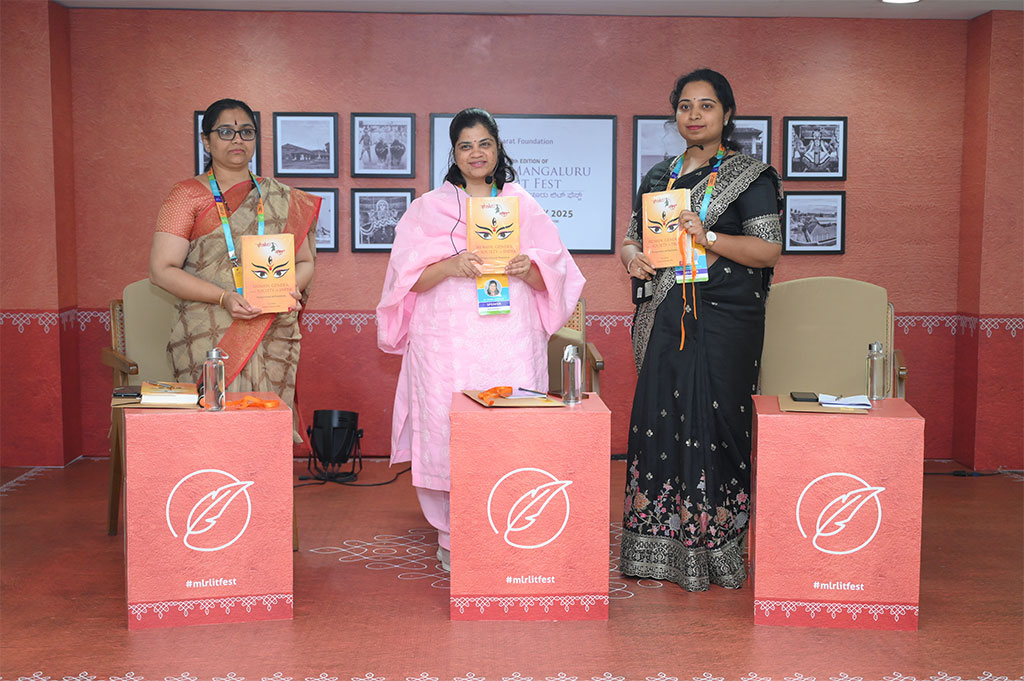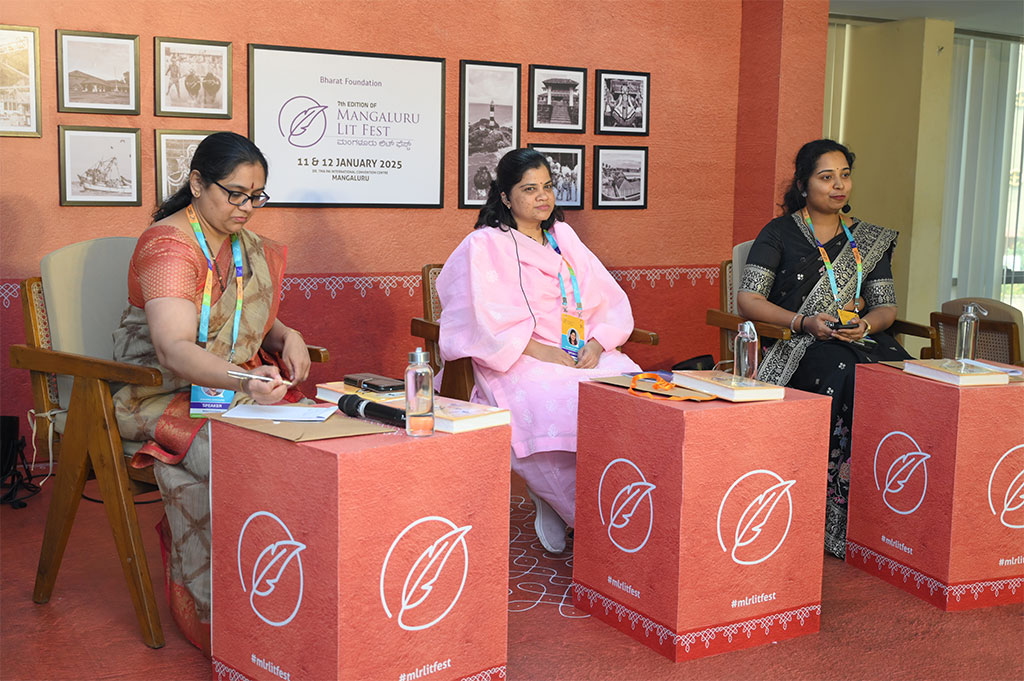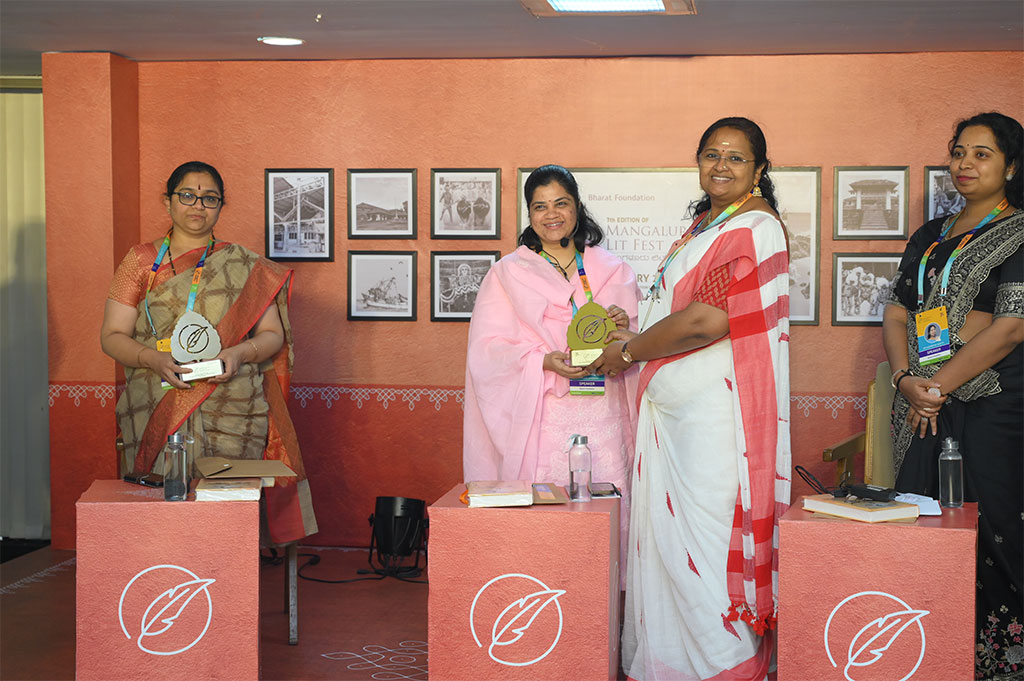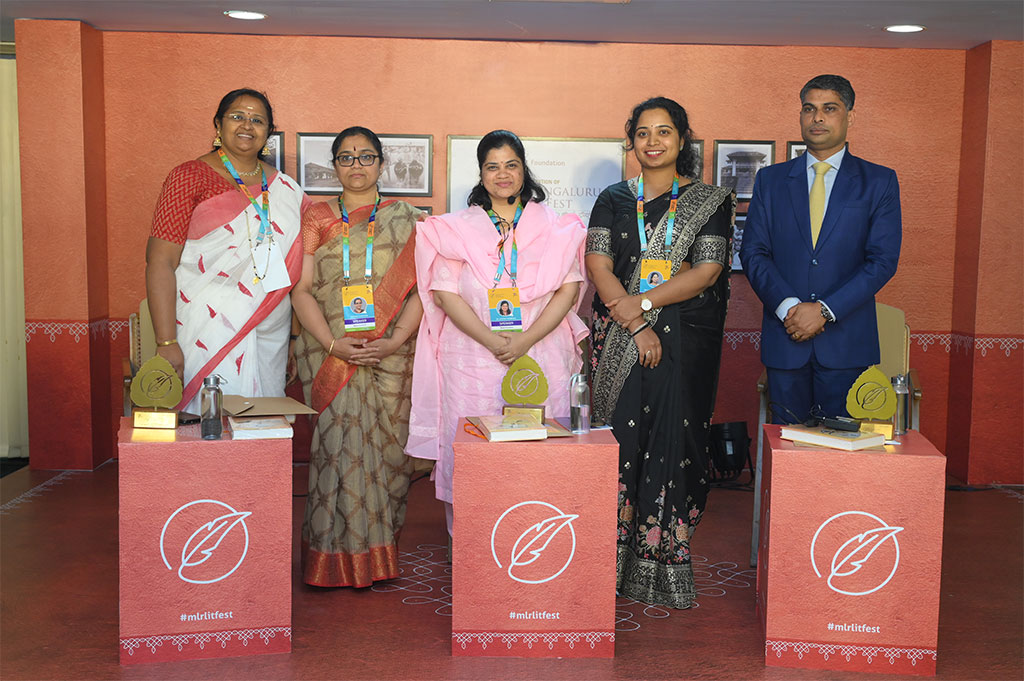Day 2 | Audi 2 – Session 3 : 12.15 pm
Dr. Varada Sambhus, Kshama Naragund and Dr. Sushmita Shetty
A compelling panel discussion titled “Women, Gender, and Society” was held, moderated by Dr. Sushmita Shetty, faculty at the Gandhian Center for Philosophical Arts and Sciences. The distinguished panel featured Dr. Varada Sambhus, an associate professor at Jawaharlal Nehru University and co-editor of Shakti: Women, Gender, and Society in India, and Kshama Naragund, an accomplished advocate with over 15 years of legal experience. The discussion delved into feminism in India, societal perceptions of gender, legal frameworks related to gender issues, and the importance of adopting indigenous perspectives on gender discourse.




Dr. Sushmita Shetty began the session by providing an overview of how gender has historically influenced societal norms and individual identities. She set the stage for a nuanced conversation by highlighting the tension between traditional gender roles and evolving modern perspectives in Indian society.
Dr. Varada Sambhus opened her remarks by discussing the need to bridge the gap between academic feminist discourse and the lived realities of Indian women, particularly those in rural communities. Drawing from her fieldwork, she shared the story of a 70-year-old diabetic woman participating in the Pandharpur Vari pilgrimage. The woman’s journey, driven purely by her personal will and devotion, challenged conventional notions of female agency, demonstrating that grassroots feminism often operates outside formal theoretical frameworks. Dr. Sambhus emphasized that India’s feminist discourse must move beyond binary ideas of gender and autonomy to accommodate these lived realities.
Following this, Kshama Naragund presented her perspective on gender perceptions shaped by legal systems and ancient Indian thought. She critiqued the binary nature of gender in modern legal frameworks, contrasting it with the more fluid understanding found in Indian philosophy. She referenced the Ratri Suktam from the Rig Veda, which portrays the feminine force as a unifying cultural symbol. Naragund underscored the need for a gender discourse rooted in harmony and complementarity, arguing that the Indian philosophical approach offers a more balanced perspective than Western feminism, which often emphasizes conflict.
The discussion then shifted to policy and legal frameworks. Dr. Sushmita Shetty asked Dr. Sambhus about the possibility of integrating various feminist approaches for an Indian context. Dr. Sambhus responded by explaining how Western frameworks often focus on individualism and conflict-driven binaries, while Indian society emphasizes relational identities and societal well-being. She highlighted concepts like Vasudhaiva Kutumbakam (the world as one family) and Purnatva (wholeness), which underscore the interconnectedness of individuals within a social and spiritual context. These principles, she argued, provide a robust foundation for gender discourse in India, encouraging coexistence and respect rather than opposition.
Addressing the legal challenges faced by both genders, Kshama Naragund shared insights from her legal practice. She noted how societal conditioning often results in rigid gender roles, with women being expected to prioritize caregiving and men being seen as primary providers. This imbalance, according to her, is reinforced by existing legal frameworks. She traced the evolution of Section 498A, which was introduced to address dowry harassment but later faced criticism for alleged misuse. While acknowledging the persistent issue of dowry, she pointed out that legal solutions must evolve to reflect changing societal dynamics. Naragund concluded by calling for an indigenous approach to legislation that addresses the needs of both men and women holistically.
In the concluding segment, the panelists discussed questions posed by the audience, focusing on practical solutions for bridging the gap between academic and lived experiences of gender. Dr. Varada Sambhus emphasized the importance of grassroots movements in shaping a more inclusive feminist narrative, while Kshama Naragund advocated for reforms in legal systems to ensure they are more adaptive and responsive to societal changes.
The session ended with a questions and answers session, where the panelists addressed audience queries, offering further insights into the discussed topics. The discussion concluded with a reminder of the importance of continuing conversations around gender and society for lasting change.
ಸ್ತ್ರೀ, ಲಿಂಗ ಮತ್ತು ಸಮಾಜ (ಪುಸ್ತಕ ಬಿಡುಗಡೆ)
ಈ ಗೋಷ್ಠಿಯು ಡಾ. ವರದಾ ಸಂಭುಸ್ ಅವರು ಬರೆದಿರುವ ವಿಮೆನ್, ಜೆಂಡರ್ ಅಂಡ್ ಸೊಸೈಟಿ ಎಂಬ ಪುಸ್ತಕದ ಬಿಡುಗೆಯೊಂದಿದೆ ಪ್ರಾರಂಭವಾಯಿತು.
ಗೋಷ್ಠಿಯಲಿದ್ದವರು: ಡಾ. ವರದಾ ಸಂಭುಸ್, ಜವಾಹರಲಾಲ್ ನೆಹರೂ ವಿಶ್ವವಿದ್ಯಾಲಯ, ನವದೆಹಲಿಯಲ್ಲಿ ಪ್ರಾಧ್ಯಾಪಕರು, ನಿಪುಣ ವಿದ್ವಾಂಸ ಮತ್ತು ಸಂಪಾದಕರಲ್ಲಿ ಒಬ್ಬರು. ಕ್ಷಮಾ ನಾರಗುಂಡ, ಪ್ರಖ್ಯಾತ ವಕೀಲ. ಸಂವಾಹಕರು: ಡಾ. ಸುಶ್ಮಿತಾ ಶೆಟ್ಟಿ, ಧಿಯನ್ ಸೆಂಟರ್ ಫಾರ್ ಫಿಲಾಸಫಿಕಲ್ ಆರ್ಟ್ಸ್ ಅಂಡ್ ಸೈನ್ಸ್ ಅಧ್ಯಾಪಕರು.
ಜಗತ್ತು ಸೃಷ್ಟಿಯಾದಾಗಿನಿಂದ ಪ್ರಪಂಚದಾದ್ಯಂತದ ಮಹಿಳೆಯರು ಪಿತೃಪ್ರಭುತ್ವದ ನಿಯಂತ್ರಣದ ಭಾರವನ್ನು ಅನುಭವಿಸುತಿದ್ದಾರೆ. ಸಿಮೋನ್ ಡಿ ಬ್ಯೂವೊಯಿರ್ ಹೇಳಿದಂತೆ ಅವಳನ್ನು ಯಾವಾಗಲೂ “ಎರಡನೇ ಲಿಂಗ” ಎಂದು ಕರೆಯಲಾಗುತ್ತದೆ.
ಮೊದಲು ಮಾತನಾಡಿದ ಡ. ವರದ ಸಂಭೂಸ್, ನಾವು ಆಯ್ಕೆಗಳ ಬಗ್ಗೆ ಮಾತನಾಡುವಾಗ, ತಾರತಮ್ಯದ ಬಗ್ಗೆ ಮಾತನಾಡುವಾಗ, ಸಮಾಜದಲ್ಲಿ ನಮ್ಮ ಲಿಂಗ ಸಂಬಂಧಗಳನ್ನು ನಾವು ಅರ್ಥಮಾಡಿಕೊಳ್ಳುವ ವಿಧಾನ ಮತ್ತು ಅದನ್ನು ಕಲಿಸುವ ವಿಧಾನದ ವಿಷಯದಲ್ಲಿ ಯೋಚಿಸಲು ನಮ್ಮ ಸುತ್ತ ಮುತ್ತ ಸಮಾಜದ ಕೆಲಸವೇ ಹೆಚ್ಚು ಎಂದು ಹೇಳಿದರು. ನಮ್ಮ ವಿಶ್ವವಿದ್ಯಾಲಯಗಳು, ಲಿಂಗ ಬೇದ ದೊಡ್ಡ ಅಂತರವಾಗಿತ್ತು, ಮತ್ತು ಈ ಪುಸ್ತಕ ಅವರು ಮಾಡಲು ಪ್ರಯತ್ನಿಸುತ್ತಿರುವ ಎಲ್ಲಾ ಕೆಲಸವು ಆ ಅಂತರವನ್ನು ಸಾಧ್ಯವಾದಷ್ಟು ಕಡಿಮೆ ಮಾಡುವುದು.
ತನ್ನ ಕ್ಷೇತ್ರಕಾರ್ಯದಿಂದ ನೆನಪಿಸಿಕೊಳ್ಳುತ್ತ, ಪಂಢರಪುರ ವಾರಿ ತೀರ್ಥಯಾತ್ರೆಯಲ್ಲಿ ಭಾಗವಹಿಸಿದ 70 ವರ್ಷದ ಮಧುಮೇಹ ಮಹಿಳೆಯ ಕಥೆಯನ್ನು ಅವರು ಹಂಚಿಕೊಂಡರು. ಮಹಿಳೆಯ ಪ್ರಯಾಣವು ಸಂಪೂರ್ಣವಾಗಿ ತನ್ನ ವೈಯಕ್ತಿಕ ಇಚ್ಛೆ ಮತ್ತು ಭಕ್ತಿಯಿಂದ ನಡೆಸಲ್ಪಡುತ್ತದೆ, ಸ್ತ್ರೀ ಸಂಸ್ಥೆಯ ಸಾಂಪ್ರದಾಯಿಕ ಕಲ್ಪನೆಗಳನ್ನು ಸವಾಲು ಮಾಡಿತು, ತಳಮಟ್ಟದ ಸ್ತ್ರೀವಾದವು ಸಾಮಾನ್ಯವಾಗಿ ಔಪಚಾರಿಕ ಸೈದ್ಧಾಂತಿಕ ಚೌಕಟ್ಟುಗಳ ಹೊರಗೆ ಕಾರ್ಯನಿರ್ವಹಿಸುತ್ತದೆ ಎಂದು ತೋರಿಸುತ್ತದೆ. ಡಾ. ಸಂಭುಸ್, ಭಾರತದ ಸ್ತ್ರೀವಾದಿ ಪ್ರವಚನವು ಲಿಂಗ ಮತ್ತು ಸ್ವಾಯತ್ತತೆಯ ಕಲ್ಪನೆಗಳನ್ನು ಮೀರಿ ಚಲಿಸಬೇಕು ಎಂದು ಹೇಳಿದರು.
ಇದರೊಂದಿಗೆ ಕ್ಷಮಾ ನರಗುಂದ ಅವರು ಕಾನೂನು ವ್ಯವಸ್ಥೆಗಳು ಮತ್ತು ಪ್ರಾಚೀನ ಭಾರತೀಯ ಚಿಂತನೆಯಿಂದ ರೂಪುಗೊಂಡ ಲಿಂಗ ಗ್ರಹಿಕೆಗಳ ಬಗ್ಗೆ ತಮ್ಮ ದೃಷ್ಟಿಕೋನವನ್ನು ಪ್ರಸ್ತುತಪಡಿಸಿದರು. ಅವರು ಆಧುನಿಕ ಕಾನೂನು ಚೌಕಟ್ಟುಗಳಲ್ಲಿ ಲಿಂಗದ ದ್ವಿಮಾನ ಸ್ವಭಾವವನ್ನು ಟೀಕಿಸಿದರು, ಭಾರತೀಯ ತತ್ತ್ವಶಾಸ್ತ್ರದಲ್ಲಿ ಕಂಡುಬರುವ ಹೆಚ್ಚು ತಿಳುವಳಿಕೆಯೊಂದಿಗೆ ಅದನ್ನು ವಿರೋಧಿಸಿದರು. ಅವರು ಋಗ್ವೇದದಿಂದ ರಾಷ್ಟ್ರೀಯ ಸೂಕ್ತವನ್ನು ಉಲ್ಲೇಖಿಸಿದ್ದಾರೆ, ಇದು ಸ್ತ್ರೀಲಿಂಗ ಶಕ್ತಿಯನ್ನು ಏಕೀಕರಿಸುವ ಸಾಂಸ್ಕೃತಿಕ ಸಂಕೇತವಾಗಿ ಚಿತ್ರಿಸುತ್ತದೆ. ನರಗುಂದ ಅವರು ಸಾಮರಸ್ಯ ಮತ್ತು ಪೂರಕತೆಯಲ್ಲಿ ಬೇರೂರಿರುವ ಲಿಂಗ ಪ್ರವಚನದ ಅಗತ್ಯವನ್ನು ಒತ್ತಿಹೇಳಿದರು, ಭಾರತೀಯ ತಾತ್ವಿಕ ವಿಧಾನವು ಪಾಶ್ಚಿಮಾತ್ಯ ಸ್ತ್ರೀವಾದಕ್ಕಿಂತ ಹೆಚ್ಚು ಸಮತೋಲಿತ ದೃಷ್ಟಿಕೋನವನ್ನು ನೀಡುತ್ತದೆ ಎಂದು ವಾದಿಸಿದರು, ಇದು ಕಾಣಬಲ್ಲ ಸಂಘರ್ಷವನ್ನು ಹೇಳುತ್ತದೆ.
ಸಾಮಾಜಿಕ ಚೌಕಟ್ಟು ಹೇಗೆ ಕಟ್ಟುನಿಟ್ಟಾದ ಲಿಂಗ ಪಾತ್ರಗಳಿಗೆ ಕಾರಣವಾಗುತ್ತದೆ ಎಂಬುದನ್ನು ಕ್ಷಮಾ ನರಗುಂದ ಗಮನಿಸಿದರು, ಮಹಿಳೆಯರು ಆರೈಕೆಗೆ ಆದ್ಯತೆ ನೀಡುತ್ತಾರೆ ಮತ್ತು ಪುರುಷರು ಪ್ರಾಥಮಿಕ ಪೂರೈಕೆದಾರರಾಗಿ ಕಾಣುತ್ತಾರೆ. ಈ ಅಸಮತೋಲನ, ಅವರ ಪ್ರಕಾರ, ಅಸ್ತಿತ್ವದಲ್ಲಿರುವ ಕಾನೂನು ಚೌಕಟ್ಟುಗಳಿಂದ ಬಲಪಡಿಸಲಾಗಿದೆ. ವರದಕ್ಷಿಣೆ ಕಿರುಕುಳವನ್ನು ಪರಿಹರಿಸಲು ಪರಿಚಯಿಸಲಾದ ಸೆಕ್ಷನ್ 4980 ಯ ವಿಕಾಸವನ್ನು ಅವರು ಪತ್ತೆಹಚ್ಚಿದರು ಆದರೆ ನಂತರ ಆಪಾದಿತ ದುರ್ಬಳಕೆಗಾಗಿ ಟೀಕೆಗಳನ್ನು ಎದುರಿಸಿದರು. ವರದಕ್ಷಿಣೆಯ ನಿರಂತರ ಸಮಸ್ಯೆಯನ್ನು ಒಪ್ಪಿಕೊಳ್ಳುವಾಗ, ಬದಲಾಗುತ್ತಿರುವ ಸಾಮಾಜಿಕ ಚಲನಶೀಲತೆಯನ್ನು ಪ್ರತಿಬಿಂಬಿಸಲು ಕಾನೂನು ಪರಿಹಾರಗಳು ವಿಕಸನಗೊಳ್ಳಬೇಕು ಎಂದು ಅವರು ಸೂಚಿಸಿದರು. ನರಗುಂದ ಅವರು ಪುರುಷ ಮತ್ತು ಮಹಿಳೆಯರ ಅಗತ್ಯಗಳನ್ನು ಸಮಗ್ರವಾಗಿ ಪರಿಹರಿಸುವ ಶಾಸನಕ್ಕೆ ಸ್ಥಳೀಯ ವಿಧಾನಕ್ಕೆ ಕರೆ ನೀಡುವ ಮೂಲಕ ತೀರ್ಮಾನಿಸಿದರು.
ಈ ಘೋಷ್ಠಿಯು ಪ್ರಶ್ನೋತ್ತರ ಚರ್ಚೆಯೊಂದಿಗೆ ಪೂರ್ಣಗೊಂಡಿತು.
